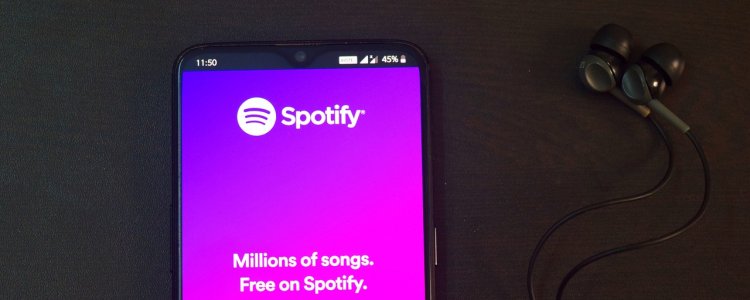Music Streaming Services: Compared
 By Jonathan Owen
By Jonathan Owen Marketing Manager
Published
17th September 2019
Last modified 31st July 2024
Last modified 31st July 2024
loveit? shareit!

Ever since music streaming became viable for the vast majority of smartphone users, it seems like every big tech company has wanted a slice of the pie. This has led, inevitably, to an over saturation of the market, with plenty of competing services on offer for you to try. But with so many options it can be difficult to know which service is best and what is unique to each one.
As we’ve explored how smartphones and streaming services have completely changed the way we listen to music, we feel that we might have some authority on this subject. This guide will go through most of the major streaming services, detailing how much they cost, what makes them unique, and whether their worth your time.
Whenever anyone mentions streaming services, it’s likely that Spotify will be the first one to spring to mind. With over 100 million paid subscribers it’s easily the most-used platform out of all the competitors, and with good reason. The service has a huge song library, including all of the latest tracks as well as lesser-known artists and exclusive Spotify Sessions that you can’t listen to anywhere else. On top of this, the Premium tier offers an offline listening mode, allowing you to download and play music even when you’re not connected to the internet – making it great for underground commutes.
Another key benefit of Spotify is that it’s compatible on all mobile devices, allowing you to share playlists with friends regardless of which phone they have. The service also has a helpful discovery tool which puts you in contact with new music based on your listening habits. Unlike other streaming services, Spotify also has a free version which offers the same amount of access to its library. However, this is ad-supported which can interrupt the listening experience and you won’t be able to listen offline.
Overall, Spotify is a solid service that does everything right, making it a superb choice for anyone who just wants to listen to good music.
A close second in terms of users, Apple’s home-grown streaming service has gone from a clunky app to a genuine contender in the market. As you might expect from the iPhone creators, the interface is minimal and easy to navigate, making Apple Music a good option for those that don’t care too much about creating playlists or sharing, but just want to find their favourite artists. The library is extensive, with over 50 million songs on offer, and there are also some exclusive studio albums from a range of artists. Like Spotify, Apple Music also has a good algorithm for finding new songs with the easy-to-use ‘For You’ and ‘Browse’ options. You also have the ability to follow artists and get alerts whenever they drop a new track.
While it may not be beneficial for all users, Apple Music has an integrated lyric system, meaning you can automatically see the lyrics to the song your listening to – perfect for singing along.
The major downside of Apple Music is that it works best on iOS devices, such as the iPhone, iPad or iPod. While it can be used on Android, it does have slightly different functionality, which may put some people off. Furthermore, if you have an Apple Home Pod, this is the only music service that’s compatible with that device. It’s not all bad, however, as Apple’s devices have all been made compatible with the streaming service. For example, Siri is fully integrated, meaning you can queue music hands-free, and it can also be installed on the Apple Watch.
It may not be the best option for every smartphone user, but if you’re a fan of Apple technology, it’s easily the most compatible and easiest to integrate across your network.
TIDAL may not have the listenership of a platform like Spotify, but it has created a comfortable niche for itself. The USP of this service is that it offers high-quality, lossless streaming sound that’s comparable to listening to a CD – if not even better! To put that in context, most streaming services slightly compress their audio in order to stream as much data as they do, which can impact the quality. This is not the case with TIDAL.
Like its competitors, TIDAL has offered timed exclusives for some albums – Lemonade and Life of Pablo are obvious examples – however its library can be lacking depending on what you’re looking for. That said, if you’re a fan or rap, hip hop, or R&B, you’ll certainly find everything you could ever need. The service also puts a big emphasis on unearthing new talent, so it’s great if you’re always on the hunt for new music.
Google’s music streaming service is a solid offering that does everything you’d expect. With over 40 million songs and playlists, it has enough to keep any fan happy. One of its key features is the Cloud Lock, which allows you to upload 50,000 songs online, essentially working as a back-up for your audio library. This also means you can listen across multiple devices.
Where Google Play may truly excel, however, is in its transition to YouTube Music Premium. This ostensibly new service is controlled directly from your YouTube account and carries over your library from Google Play. One of the main draws of this streaming service, compared to its competitors, is that you’ll be able to stream high-quality music videos as well as audio, whenever you want. This offers unparalleled access to live tracks and multimedia experiences that aren’t available elsewhere.
Amazon’s service is built around being personal, so rather than updating the homepage with the latest tunes, it offers a curated selection of songs it thinks you’ll like. This is alongside an extensive catalogue of popular music. One of the main advantages of Amazon Music is that it’s free for those with an Amazon Prime subscription, which can make it one of the cheapest streaming services available.
As this service is part of the wider Amazon brand, it also works nicely with in-home technology such as the Amazon Echo range – offering features such as exclusive radio channels. What’s more, you can limit your subscription to a single device, including an Amazon Echo or Fire TV stick, which reduces the cost significantly.
While it may not have all of the features of the other services out there, it certainly offers a lot of variety and options for those that want a flexible choice.
According to the latest figures, Deezer actually has the largest music library of any streaming service, marginally beating out Spotify. So if you’re the type of person that’s always looking for something new to listen to, Deezer might be the best option. One of its best features is the Flow option, which acts as a continuous shuffle mode, introducing new music that it thinks you’ll like based on what you’ve listened to the most.
The premium HiFi service follows TIDAL’s lead and offers high-quality digital sound at an increased price band. When this is combined with the large library, it’s a great choice for audiophiles that only want the best sound.